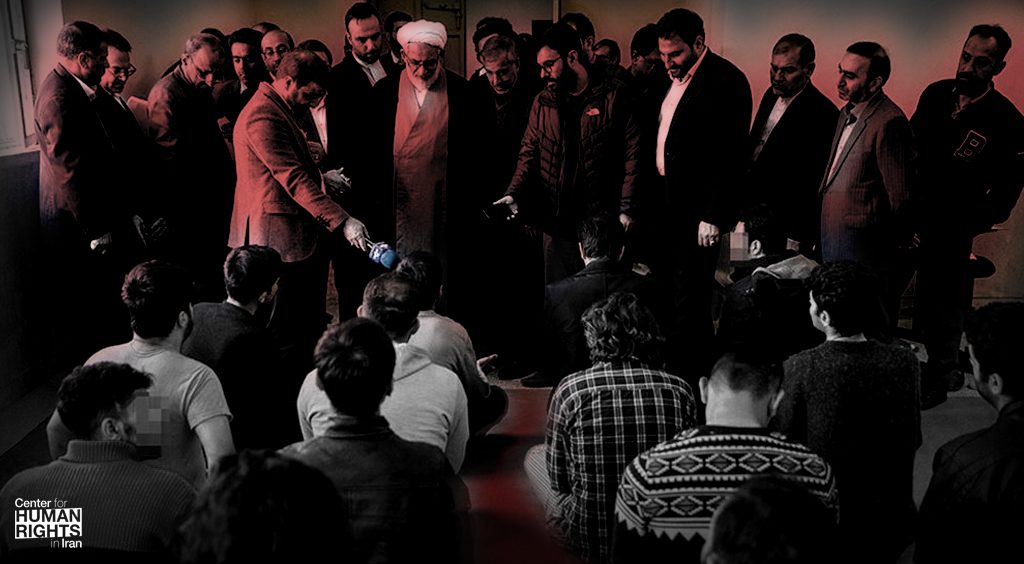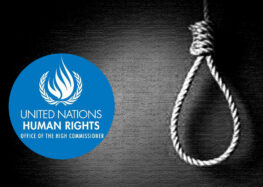Detained Protestors in Iran: Beaten, Tortured, Forced to “Confess”

February 10, 2020 – Detainees held in Iran since the November 2019 street protests—including juveniles—are being beaten, forced to make self-incriminating statements and held in inhumane incarceration conditions, and their families are not being informed of their whereabouts and condition, the Center for Human Rights in Iran (CHRI) has learned from first-hand accounts in Iran.
CHRI calls upon the Iranian authorities to exercise appropriate oversight in all detention centers and immediately:
- Stop the beatings of protestors underway in Iranian prisons
- Immediately end the forced extractions of so-called “confessions”
- Inform the families of all detainees of their whereabouts and condition
- Guarantee due process rights for all detainees
- Provide proper incarceration conditions
“The Iranian authorities killed hundreds when they used lethal force against protestors, and now they are beating and forcing false confessions from the ones they arrested,” said Hadi Ghaemi, CHRI executive director.
“The international community should speak out against these egregious rights violations and not let the victims—which include children—disappear into the black hole of the Iranian judicial system,” Ghaemi added.
To date, the Iranian government has not provided official numbers on those killed, injured or arrested. However, the spokesman of Parliament’s National Security Committee Hossein Naqavi Hosseini gave an early estimate of 7,000 people arrested during the November 15 protests.
On December 16, Amnesty International reported that at least 304 people, including women and children, had been killed. Other sources have reported higher numbers, with some estimates reaching past 1,500.
In addition to beatings and forced “confessions,” the families of the detainees—including juvenile detainees—are not being informed of their loved ones’ whereabouts or condition.
A defense attorney representing detainees in Tehran told CHRI that he’d been informed that “more than 300” who were arrested in the crackdown are currently in the Greater Tehran Central Penitentiary (GTCP), which former political prisoners who were held there have described as “hell” for its inhumane living conditions.
“The men are being held at the recently constructed Ward 5, which lacks basic facilities,” said the attorney who requested anonymity for fear of reprisals.
“The women are in an enclosed area that used to be a basketball court, where they sleep on the floor in conditions with insufficient ventilation and facilities,” said the attorney.
CHRI was unable to independently verify these numbers because the Iranian government takes extreme measures to prevent information about detainees and prisoners jailed in politically sensitive cases from being publicized.
These measures include holding detainees incommunicado, imprisoning and threatening their relatives and lawyers to prevent them from speaking publicly about their cases, and subjecting current prisoners to additional punishment.
The numbers cited in this report were provided by sources with detailed knowledge of current cases and could be higher. These sources spoke on the condition of anonymity to protect their security and the security of their sources.
Juveniles Among Detainees Who Were Tortured, Pressured to “Confess”
On December 24, 2019, the Ammar Cyber Headquarters, which maintains close ties to the Islamic Revolutionary Guard Corps (IRGC), reported via its Telegram messaging app channel that agents of the Intelligence Ministry had arrested 166 individuals between the ages of 15 and 18 and taken them to juvenile correctional facilities.
A 17-year-old former detainee who was released on bail in the city of Ahvaz told CHRI that he was “severely tortured with batons and [electric] shockers” and that his interrogators were focused on establishing a link between him and alleged foreign contacts.
“When they were trying to get me to confess, the majority of their focus was on having connections abroad and they would tell me to write down who incited and encouraged me to come to the streets,” said the detainee, adding that he is now suffering from back problems.
Another former detainee who was released on bail in Tabriz, East Azerbaijan Province, noted a similar experience in an interview with CHRI.
A detainee released on bail in Tehran told CHRI that agents of the IRGC severely beat him and his cellmates and attempted to extract coerced confessions from them while keeping them inside “metal containers” that were set up adjacent to Ward 5 of the GTCP.
“On the first day, when I was taken to be interrogated, as soon as I entered someone punched me hard in the face, beat me,” said the source. “Then I was sent back to the ward without being interrogated.” It was as if they wanted to let me know what I was in for. They behaved the same way with other detainees.”
“As the interrogations progressed, they insisted that I should provide a written statement saying that I had been acting on orders received from abroad and that I intended to send the videos and photos [of the protests] that I had taken with my phone to adversary groups outside the country,” said the source. “They had no evidence to back that up. I had not sent those images to anyone.”
Families Desperate For Info On Missing Loved Ones
More than 400 people remain detained in Khuzestan Province, according to human rights activist Karim Deyhimi, who added that in some cities—Mahshahr, Ahvaz and Khorramshahr—relatives are still trying to locate their loved ones three months after they were arrested.
“In the first days of the protests, we had a figure of more than 800 detainees [in Khuzestan Province],” said Deyhimi who has detailed knowledge of the situation on the ground. “Some of them were soon released without bail. They only had to sign a pledge [that they would refrain from further protest]. Some others were freed on bail set at 300 million to 500 million tomans ($64,393-$107,321).”
“We unfortunately don’t know anything about the fate of some of the detainees who were engaged in sharing news, videos and photos,” Deyhimi added. “Neither we nor their families have any information.”
Deyhimi said some families fear their missing loved ones were killed in the crackdown.
“All we know is that they are being held by the IRGC’s Intelligence Organization. Some of them include individuals who were injured in Shadegan [city] and taken to the Moarefizadeh Hospital where they were arrested and taken away,” he said. “Their families are very worried that they may be among those who died.”
Deyhimi added: “There are some detained in Sheiban Prison in Ahvaz and the central prisons in Abadan and Mahshahr. But the ones whose fate is unknown are being held in the detention centers of the IRGC’s Intelligence Organization. The activists who have a history of engagement or detention are under a lot more pressure.”
Some parents are still desperately seeking information about their detained children.
“In Mahshahr… some of the families there don’t even know where their children are detained,” he said. “They have gone to the revolutionary court and the Intelligence Ministry’s offices to inquire, but they haven’t gotten answers.”
Detainees Held in Overcrowded, Inhumane Conditions
A defense attorney in Tehran told CHRI that “three groups of detainees” who were arrested in the November crackdown are being held in the capital, and that additional courts have been assigned to them because the “number of case files is so large.”
1) “The first group were arrested on the streets during the protests. Some of them have been released on light bail because the detention centers don’t have enough capacity.”
2) “Another group are people who were arrested during or after the protests by security agents who identified them on video footage from closed-circuit cameras.”
3) “Another group are people who were arrested during or after the protests by security agents who identified them on video footage from closed-circuit cameras. My colleague and I are representing some of them.”
“The number of case files is so large that in addition to branches 15, 26 and 28 of the Revolutionary Court, which deal with political and security cases, branches 22, 24 and 29, which deal with drug cases, are also getting involved in prosecuting the November 2019 detainees,” added the attorney.
Another attorney representing detainees in Tehran told CHRI that his clients have been charged with “assembly and collusion against national security” and “disturbing order and public peace” based on Article 610 and 618 of the Islamic Penal Code, as well as “propaganda against the state” and “insulting the sacred.”
“The only basis for the prosecution of these cases is self-incriminating ‘confessions’ extracted by the authorities and the fact that the detainees were present at the protests,” the attorney added. “Also, after being arrested, their phones and computers were searched by security agents to find excuses to prosecute them for propaganda against the state.”
Prohibitive Bails Meant to Keep Detainees Behind Bars
Tehran-based human rights attorney Mohammad Hossein Aghasi told CHRI that many detainees have the right to be released before trial but were assigned unaffordable bail amounts.
“Many of these detainees should be freed as they have been in prison for long periods and gone through preliminary investigations,” he said. “But the authorities have made the bail amounts so high that these individuals cannot afford them.”
Aghasi said the mother of one detainee from Robat Karim in Tehran Province had informed him that her son, who was charged with “disturbing order and public peace,” was facing a bail amount of 500 million tomans, approximately $107,321.
“The authorities are being very harsh with these detainees,” he added. “One of my clients is a housewife who parked her car in the middle of the highway, blocking traffic. She was freed on bail but charged with ‘causing unrest’ and ‘assembly and collusion’ [against national security] because they found messages she had sent to several friends, telling them to join the protest.”
According to the Note to Article 48 of Iran’s Criminal Procedures Regulations, detainees charged with national security crimes can be stripped of their due process and prisoners’ rights, including the right to choose a lawyer of their choice.
“Last year the Iranian government sentenced multiple human rights attorneys to long prison terms in order to deny political prisoners proper defense,” said Ghaemi. “Today detainees are being forced to navigate the judicial and prison systems without that crucial lifeline.”
“It’s imperative that governments who maintain relations with Iran speak up for these detainees, whose lives are in the hands of judicial and prison officials that have repeatedly shown contempt for international standards of due process including the presumption of innocence,” he added.
Read this article in Persian.






